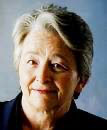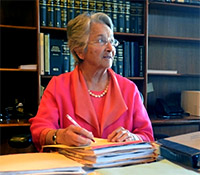The Volunteer Who as a Superior Court Judge Threw Out California’s Lethal Injection Procedure — Faye Hooker D’Opal (Colombia)
 Faye Hooker D’Opal earned a bachelor’s degree from Hendrix College in Arkansas and a Doctorate in Jurisprudence from New College of California, San Francisco. Faye commented that a motivating factor in deciding to earn a law degree was based on her earlier experience of racial discrimination while growing up in rural Arkansas. This is where her legacy of community service began where she participated in the historic efforts to desegregate Little Rock’s public schools.
Faye Hooker D’Opal earned a bachelor’s degree from Hendrix College in Arkansas and a Doctorate in Jurisprudence from New College of California, San Francisco. Faye commented that a motivating factor in deciding to earn a law degree was based on her earlier experience of racial discrimination while growing up in rural Arkansas. This is where her legacy of community service began where she participated in the historic efforts to desegregate Little Rock’s public schools.
Peace Corps
In 1963–65, she became a Peace Corps Volunteer in Colombia, one among the first women to serve in that capacity. In her first year, she worked in health/community development programs, based in a local health center serving an area of 9,000 people. Its primary goal was to develop an extensive program in preventive medicine. Faye also participated in various development activities in four other nearby communities. She and her colleagues were successful in establishing a handicraft cooperative (making woven straw items), which became a member of the Federation of Handicraft Cooperatives in Colombia.
In her second year of service, Faye was a Volunteer Leader, the first woman in Peace Corps/Colombia to attain that status. She worked in the Department of Atlantico, serving in a liaison position between Volunteers and staff in Bogota. Her position consisted of program development and administrative responsibilities. She found that the most satisfying aspect of her job was working with the various host country agencies at the state level and developing programs with them.
After her Volunteer days were over in 1965, she traveled throughout parts of South and Central America, then for a period of three months she worked for the Civil Rights Action Committee of Gulfport, Mississippi. This involved working with local government leaders in attempting to address some of the problems associated with low-income neighborhoods.
In 1966, Faye became Associate Peace Corps Country Director in Costa Rica, and directly supervised 45 Volunteers in Community Development Programs, a major component of the 140 Volunteers then working in the same programs. The program itself had an emphasis on close coordination with the country’s National Office of Community Development. Together, they initiated activities in leadership training and the strengthening of organizational structures at the local level. In this manner, they were able to help them play an active role in the determination of their individual and collective destines. The leadership program was conducted through seminars, short courses, and small group discussion structures. Collectively, these programs were designed to promote an indigenous volunteer movement in Costa Rica, utilizing some of the techniques from the VESPRA Program in Puerto Rico. The target group for this program was unemployed youth leaders between the ages of 18-25.
Faye’s work in Costa Rico also included the coordination of Peace Corps programs with the country’s Ministries and Institutions, requiring major efforts of administrative detail and paperwork. Of her greatest pride emanating from this experience was that it attracted key Volunteers with skills in developing park systems. Eventually, this led to the creation of the National Park System throughout Costa Rico.
Moving on, during the period 1970-72, Faye worked as a Cooperative and Training Consultant for Peace Corps in Brazil. She also managed to work with women in the community on health and nutrition issues. Faye received a Certificate of Special Congressional Recognition in 1994, and Certifications from the Governments of Costa Rica and Colombia for her Peace Corps work. She also received the ‘Beyond War Award’ for her achievements in the Peace Corps.
Community service
After her extensive career with Peace Corps, Faye began her community and legal activities in Marin County, California. She was Director of Legal Aid of Marin; President, Marin Abused Women’s Services for four years; three years as President, Marin National Women’s Political Caucus; Director of MWCA of San Francisco, Marin & San Mateo; and was a member of Triangle Alliance of Marin, the Ensemble Theatre Company; and the Greenbrae Boardwalk Resident Committee. For her community work, Faye received the County of Marin Human Rights Commission’s Martin Luther King Jr. Humanitarian Award for outstanding achievement in human and civil rights.
The bench
In 2004, Faye was elected to the Marin County Superior Court Bench, defeating seven male candidates for the job. She served in that role serving until January 2017, after choosing not to run for re-election in 2016.
 In 2011, while on the Bench as a Superior Court Judge, she threw out California’s death penalty procedure, throwing the state’s already stalled capital punishment system into further doubt. In May 2013, the Appeals Court upheld the Judge’s ruling.
In 2011, while on the Bench as a Superior Court Judge, she threw out California’s death penalty procedure, throwing the state’s already stalled capital punishment system into further doubt. In May 2013, the Appeals Court upheld the Judge’s ruling.
In December 2016, hundreds of colleagues and friends gathered to honor Faye’s retirement from the Bench. The standing room only party brought together a diverse crowd who had worked with her at the Marin Community Foundation, the Peace Corps, Legal Aid of Marin, Marin Abused Women’s Services, Marin National Women’s Political Caucus, and the San Francisco YWCA to name, but a few of the organizations in which Faye had been a leader.
A moving tribute came from Congressman Jared Huffman who honored Faye by having his comments made part of the U. S. Congressional Record, commending Faye “for her advocacy for abused women, for the Legal Aid of Marin, and her work as Trustee of the Marin Community Foundation.”
She continued as a pro tem judge in juvenile law, and in her pursuits to eliminate domestic violence.
Most assuredly, Faye Hooker D’Opal’s community and legal work serve as vivid exemplars of adherence to Peace Corps’ 3rd Goal, meriting her a well-earned Profile in Citizenship.
I remember Faye Hooker from Colombia. At a time when women were treated very differently than men, particularly on college campuses, Peace Corps promised that men and women would be treated equally in the program. It was one reason I joined.
Faye Hooker was a legend in her own time. I believe she was a member of Colombia VIII and I was a member of a much smaller group, all women, who followed Colombia VIII by four weeks. My assignement was in rural Southern Colombia, but we all knew of Faye Hooker, Peace Corps Volunteer Leader up north. I don’t think I ever met her, but she was known as being tough, brave, and universally respected. She certainly proved the value of women in leadership positions and her career accomplishments were outstanding.
Thank you, Marian, for posting this story. Thank you, Faye, for your service and your example.